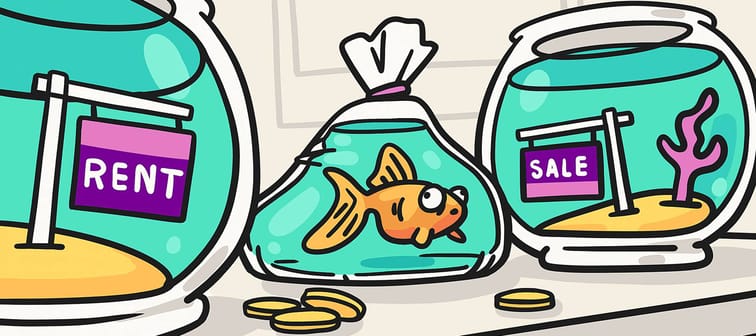Understanding why we feel compelled to buy
Bradley Ruffle, an economics professor and the academic director of McMaster University’s Decision Science Laboratory, says homeownership is often seen as a status symbol.
From a behavioural economics perspective, which draws on both psychology and economics to uncover why people spend the way they do, it’s pretty clear why homeownership is so valued.
“It's part of the American dream to be able to afford a home,” says Ruffle. “It's a sign that you've made it. And there is a limited supply of homes for purchase so the fact that you are able to buy one makes you a member of this exclusive club.”
As for whether buying a home is a great investment, Ruffle says it’s historically been a low-risk long-term asset that makes people feel safe.
Renting long term, on the other hand, carries many of the inverse perceptions. Renters tend to worry about the stability of their situation and feel a lack of control since their landlords can evict or jack up their rent at any time.
“Humans are, by and large, risk-averse,” says Ruffle. “And owning a home is a risk-averse thing to do; it protects you against the uncertainty of renting.”
Empower Your Investments with Q Trade
Discover Q Trade's award-winning platform and take control of your financial future. With user-friendly tools, expert insights, and low fees, investing has never been easier.
Start Trading TodaySo what’s the problem?
For generations, buying your first home has served as an important milestone. But Ricardo Tranjan, the senior researcher for the Canadian Centre for Policy Alternatives Ontario chapter, says we need to question that premise.
Tranjan says that all the economic and social pressures to become a homeowner can result in some people feeling compelled to make risky financial decisions like borrowing money from family and friends, committing to high monthly mortgage payments and even forgoing home inspections to clinch a sale.
“For many first-time homebuyers, that purchase is an act of desperation,” says Tranjan.
Worsening market
After years of interest rates at record lows, inflation has forced the Bank of Canada’s hand.
Even before the BoC’s third rate hike was announced in June, one in four homeowners surveyed by Manulife Bank say that they will have to sell their homes if interest rates increase further.
Another 0.25% hike on Wednesday, June 7 hasn't helped matters either.
“Even with interest rates going up, it’s not rational behaviour we’re seeing,” says Tranjan. “When you talk about housing being treated as a financial asset, that means that housing now has an irrational and sort of unpredictable behaviour that surrounds that entire industry.”
Don’t Miss
- Do the traditional rules of homebuying apply to young Canadians trying to buy a home in 2023? Should you always save up 20% for your down payment? Should you get a fixer-upper or a new build? Hosts Cadeem and Bethan sit down with real estate specialist Steve Saretsky and mortgage expert Asif Kasim to get their take on 5 bits of classic homebuying wisdom to see if they hold up to the realities of today's housing market. Join our hosts weekly on the Half Banked Podcast as they ask the big money questions that matter to young Canadians. Episode 6 is now available on all major podcast platforms including Spotify and Apple Podcasts.
Unexpected vet bills don’t have to break the bank
Life with pets is unpredictable, but there are ways to prepare for the unexpected.
Fetch Insurance offers coverage for treatment of accidents, illnesses, prescriptions drugs, emergency care and more.
Plus, their optional wellness plan covers things like routine vet trips, grooming and training costs, if you want to give your pet the all-star treatment while you protect your bank account.
Get A QuoteWhen it doesn’t make sense to buy a home
With all these factors converging, it’s a perfect time for hopeful homeowners to pause and seriously consider their financial situation before making an offer.
Ben Felix, a portfolio manager with PWL Capital in Ottawa, created a rule of thumb for situations just like this. Felix originally came up with a model to help clients who wanted to figure out if they could afford homes, or if it made more sense to continue renting.
That model eventually turned into his five per cent rule.
To help people choose between renting and buying from a financial standpoint, Felix compares the unrecoverable costs of both options.
With renting, it’s easy — your unrecoverable costs are your rent. As for homeowners’ unrecoverable costs, Felix settled on three: property taxes, maintenance costs and cost of capital (which includes your mortgage interest and the investing opportunity costs you pass up by putting your money in a home).
Together, those expenses generally add up to about five per cent of your mortgage every year that you won’t see any return on your investment.
How the five per cent rule works
Now for the formula. Multiplying the value of the home you’re looking at by five per cent and then dividing that number by 12 will give you your monthly unrecoverable costs.
“If you can rent for less than that, renting may be a sensible financial decision,” Felix writes on the PWL website. And if it’s cheaper to rent, investing the difference elsewhere could be higher risk, but also higher reward.
You can also run the numbers backwards to see what mortgage you could afford, based on your current rent. All you have to do is take the rent amount, multiply it by 12 and then divide by five per cent.
That means someone paying the average of $2,526 to rent a one-bedroom apartment in Toronto would want to look for a mortgage of no more than $606,240 if they’re hoping to stick to the same amount of annual unrecoverable costs.
“People do rush into homeownership because they think it's a good financial decision,” says Felix. “I do think that just that five per cent rule of generalization that renting is not throwing money away, that is such an important starting point [that] can help people not rush into such a big thing.”
Making the final call … for right now
So how does one decide if buying a home is risky given their current situation?
Run your numbers with the five per cent rule and talk to a financial professional to help you stress test your situation by evaluating it under a few different scenarios — such as another interest rate hike.
And finally, Ruffle says to have an honest self-check-in.
“Make sure it's what you want and make sure it's a sound financial decision, as opposed to doing it for other less valid reasons.”
For those who opt to continue renting for now — or forever — Felix would remind them that doesn’t mean you can’t freshen up a rented space to meet your specific needs. And on top of that, sometimes unrecoverable costs are worth it.
“I think one of the interesting things that people don't often realize about renting is that if you really want to, you can propose to a landlord that you want to make changes to a property,” he says.
“I built a deck in one of the places that we rented … and that was amazing. We enjoyed that deck for three years. Would I have recovered some of that cost if I owned it and sold the home? Maybe, but maybe not.”
More: Rent versus sell condo
Sponsored
Trade Smarter, Today
With CIBC Investor's Edge, kick-start your portfolio with 100 free trades and up to $4,500 cash back.









